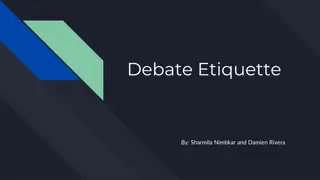Congressional Debate Essentials: From Legislation to Speech Delivery
Delve into the structure and proceedings of a simulated United States Congress session, covering terms, legislation analysis, speech drafting, and delivery. Explore key bills and resolutions, their debate process, and how to actively participate in discussions through a detailed agenda. Enhance your knowledge on common Congressional terms, from dockets to motions, and sharpen your skills in presenting well-rounded arguments and refuting counterpoints effectively.
Download Presentation

Please find below an Image/Link to download the presentation.
The content on the website is provided AS IS for your information and personal use only. It may not be sold, licensed, or shared on other websites without obtaining consent from the author.If you encounter any issues during the download, it is possible that the publisher has removed the file from their server.
You are allowed to download the files provided on this website for personal or commercial use, subject to the condition that they are used lawfully. All files are the property of their respective owners.
The content on the website is provided AS IS for your information and personal use only. It may not be sold, licensed, or shared on other websites without obtaining consent from the author.
E N D
Presentation Transcript
The Classy and the Dapper: Congressional Debate Moving from Point A to Infinity and Beyond
Agenda What s going on [at least for the next 40 minutes]: Recap Event and Structure Review Terms Analyze Legislation Prepare Speeches Refutation Refocus Presentation [in speeches] Strategy
Objectives By the end of this webinar , I will be able to: Recall common terms used in Congress Outline the structure of a session Delineate arguments from legislation Draft a speech [outline] Deliver a speech
Overview: Event Structure What is it? Simulation of the United States Congress (both chambers) What happens? Discuss/Debate Legislation Affirmative/Negative- questions For how long? 2-3 hours
Review:Terms Terms that will be referenced throughout: Docket: Packet full of legislation (bills and resolutions) Authorship: First speech given on a bill/res. Presiding Officer: Student elect individual who runs the session Caucus: Formal/ informal discussion with competitors about how to order the agenda [docket] Motions: Actions in the chamber (how to do things)
Delineate Arguments From Legislation Text
Legislation: Bills The Muhammad Ali Expansion Act When passed, are implemented into law. Have 5 sections- each serves a different purpose- and all are up for debate.
Legislation: Resolution A Resolution to Remove Anti- Missile Systems from South Korea + When passed, simply become an outline for a bill. + Shorter- debate is focused on the resolved clause(s) + Constitutional Amendments follow this outline
Where do I start? The Muhammad Ali Expansion Act 1. Read the bill text 2. Read background information (if necessary) 3. Create advocacy based on section 1 Shift that based on the preceding sections *Keep the text in mind when you prep.
Where do I start? A Resolution to Remove Anti- Missile Systems from South Korea + Read the resolved clause + Read background information + Create advocacy based on resolved clause
Common Questions/Concerns How do I research? In a document attached (based on your skill level). Where do I keep my research? Wherever you re comfortable- Dropbox, Google Docs., Evernote, etc. What if my arguments are stolen? Depending on how you re prepping this can be avoided....read more in the research document attached!
Speech Structure Reminder: Speeches are 3 minutes
Speech Structure: General Overview Intro Point 1 Refutation Point 2 Refutation Conclusion
Intro 3 Parts Conclusion -Ideally, you want to follow the inverse of the intro...but time doesn t always allow for that -Attention Getting Device (AGD) -'Introduces' your speech; gain attention; nothing crazy -Structure goal: Link to advocacy - Link: -Narrows down your attention getter to the justification -Strategic goal: Leave a lasting thought -Justification: -Explains why I'm listening to your speech. -Equivalent to a thesis: One statement to describe your advocacy
Point Construction 4 Parts: Claim:The general argument that you're making Example Military aid is a prerequisite to effective development in the Sahel Region Warrant: The reason why your claim is true That s because if the Sahel Region is not stable, developmental projects cannot be carried out Evidence: The how or why connection between the claim and warrant (data, literature) Dak Prescott for the Belfer Center at Harvard University [May 2017]: Insurgencies can use violent attacks to purposefully disrupt the project and threaten the security of the project staff, leading the implementing agency to withdraw. Even if it continues, insurgents can hinder its successful implementation by attacking project staff and destroying project infrastructure. Impact: Explains what your argument means/ who it affects Obvious impact: Protect innocent lives Deeper impact: More stable, more investment
Point Construction Construction is extremely diverse More structures are moving away from the traditional format. That means: More general explanation of argument instead of strict structure Reference of cites rather than analysis Less focus on impact analysis
Refutation Critical to moving debate forward (tearing down arguments, creating new ground, etc.) Flowing the session helps!! How (most basic form): Falsify (prove not true) Even if (true...but not unique because...) Minimize (true...but only kind of) Outweigh (aff. arg/ neg. arg are more important) Presentation: Name, recap, response+ reasoning Ex: Ms. Lane argued X, that's false because...
Common Questions/Concerns Do I have to adhere to this exact structure? No! This is just an argument structure that s rather effective. Do what you re comfortable with. Where do I put refutation in my speeches? Doesn t matter as long as it s there. There are strategic places to put your refutation (direct clash for example), but as long as your segues are clear the place isn t critical. Are there refutation speeches? Yes. Congress, like the other debate events, has a structure of flow: Constructive, Refutation, Crystallization
Presentation The Big 3: Volume, Clarity, Eye Contact
Presentation: Volume Project- Speak from diaphragm Big Room Performances
Presentation: Clarity Speed Speak slower than you may feel comfortable - it will also improve fluency However, make sure you can still fit within allotted time Fluency Avoid using filler words (um, uh, like, etc.) Use strategic pausing to organize thoughts Emphasis When? Important numbers/statistics Important words/phrases How?
Presentation: Eye Contact Look up when possible Less important than others - in this competition don t sacrifice fluency, etc. for eye contact Makes it seem like you know what you are talking about Don t type out or write out your whole speech
Common Questions/Concerns Is presentation more important than argumentation/ refutation? No. It can help you but overall there should be a [somewhat] equal balance between argumentation, refutation, and presentation. Should I change anything about my presentation depending on my judging panel? No. You should be well rounded enough in various sectors that it s appealing all around.
Strategy: Speaking Early If you re limited in research/evidence to refute other speakers: Give the constructive points that are pre-prepared If you want to establish precedence and give yourself better recency/flexibility to speak whenever you want for the following bill
Strategy: Speaking Middle/Late Build: You should also advance and bolster your own side Don t rehash- explain how what you re adding to the debate changes it Refute: Follow the burden of refutation as the debate moves forward Crystallize: Explain what s happened in the debate and why it matters
Strategy: Presiding Strategic relief! Lighten your speaking load Accolades and Respect Show your peers and judges you are versatile and worthy of acclaim. Political Capital Run the chamber in exchange for clout (ethically) POing outrounds is risky, POing finals is a #statement
Strategy: Leadership Don t.Be.Rude. Don t call previous question with the intention of cheating people out of speeches No one gets extra points for being the first to nominate a docket, call the previous question or go to recess do not jump up! If no one really knows what s going on before the round begins, take a leadership role!! (Grab that marker and start asking for others opinions) Start talking with the chamber and take a lead in preparing the docket so it doesn t take 56 hours out of speaking time when the round starts. Include that new kid or the quiet group they are just nervous like all of us were at one point
Strategy: Ethics Be friendly!!! Talk about life outside of debate (because that exists) and make friends!!! Save your evidence as pdf files on your computer. Need full text. Follow the rules- don t find a way around Cheaters never win. The Patriots did. That s why we don t like them.
Some of the great leaders in history were not adored, but respected. My advice to leaders- stop trying to please everyone and do what you believe is best Nick Saban, University of Alabama (Head Football Coach)


![Prevention and Combating of Hate Crimes and Hate Speech Bill [B.9B.2018]](/thumb/60513/prevention-and-combating-of-hate-crimes-and-hate-speech-bill-b-9b-2018.jpg)




















